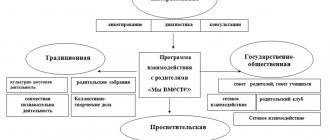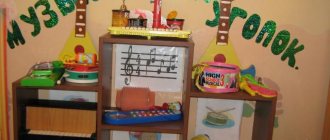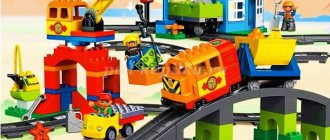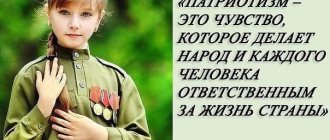Article “New approaches to interaction with the family of preschool children within the framework of the Federal State Educational Standard”
Leisure forms of organizing communication are designed to establish warm informal relationships between teachers and parents, as well as more trusting relationships between parents and children (joint holidays and leisure activities). Leisure forms of cooperation with the family can only be effective if educators pay sufficient attention to the pedagogical content of the event.
Cognitive forms of organizing communication between teachers and families are intended to familiarize parents with the characteristics of the age and psychological development of children, rational methods and techniques of education for the formation of practical skills in parents.
The main role continues to belong to such collective forms of communication as meetings, group consultations, etc. The principles on the basis of which communication between teachers and parents are based have changed. These include communication based on dialogue, openness, sincerity in communication, refusal to criticize and evaluate the communication partner.
Cognitive forms of organizing communication between teachers and parents are designed to play a dominant role in improving the psychological and pedagogical culture of parents, and therefore contribute to changing the views of parents on raising a child in a family environment, and develop reflection.
Visual and informational forms of organizing communication between teachers and parents solve the problem of familiarizing parents with the conditions, content and methods of raising children in a preschool educational institution, allow them to more correctly evaluate the activities of teachers, revise the methods and techniques of home education, and see more objectively the activities of the teacher. Visual information forms are conventionally divided into two subgroups. Familiarizing parents with the preschool educational institution, the features of its work, with teachers involved in raising children, and overcoming superficial opinions about the work of the preschool educational institution. The objectives of one of them - information and awareness-raising - is to familiarize parents with the preschool educational institution, the features of its functioning, the activities of teachers, etc. The tasks of the other group - information and education - are close to the tasks of cognitive forms and are aimed at enriching parents’ knowledge about the features of the development and upbringing of preschool children. Their specificity lies in the fact that the communication between teachers and parents here is not direct, but indirect - through newspapers, the organization of exhibitions, etc., therefore we have identified them as an independent subgroup, and not combined with cognitive forms.
“Open Days” are especially popular, during which parents can visit any group - this makes it possible to introduce parents to the preschool institution, its traditions, rules, features of educational work, to interest them in it and attract them to participate.
MAGAZINE Preschooler.RF
Form of cooperation between preschool educational institutions and families in the context of the Federal State Educational StandardIf a child grows up in an atmosphere of love and tenderness, although at times you show reasonable firmness, he will retain his friendly attitude towards people because it is inherent in his nature.
Benjamin Spock
This epigraph by an outstanding American psychologist, doctor, teacher expresses the whole essence of the interaction between the teacher and parents in a joint desire to help each child create an image of his “I” , that is, to acquire the necessary personal qualities during his stay in kindergarten, to form those psychological new formations that will help him successfully complete his course at school. And the first authority on a child’s path to life is the FAMILY.
The family is the primary source and model for the formation of a child’s interpersonal relationships; mom and dad are role models.
There is no other such institution, except the institution of the family, which so accurately predetermines the patterns of formation of the future person. Behind behavioral problems and the characteristics of children's relationships, adults are visible - their view of the world, their position, their behavioral stereotypes.
It is hardly possible for a child to develop harmoniously without the active participation of his parents. And, the main feature of family education is a special emotional climate, thanks to which the child develops an attitude towards himself, which determines his sense of self-worth.
Another important role of family education is the influence on the value orientations, worldview of the child as a whole, and his behavior in various spheres of public life. Practice has proven that it is the example of parents and their personal qualities that largely determine the effectiveness of the educational function of the family.
The importance of family education in the development of children determines the interaction between family and kindergarten. However, this interaction is influenced by a number of factors, most notably what parents and educators expect from each other. I believe that the main goal of all forms and types of interaction between a preschool educational institution and the FAMILY is to establish a trusting relationship between children, parents and educators, to unite into one team, to share their problems with each other and solve them together.
The sincere interest of adults - parents, teachers - at every moment of his life creates a good opportunity for the development of positive child-parent relationships.
“On Education” , which appeared in 1995, obliges teachers and parents to become not only equal, but also equally responsible participants in the educational process.
Parents, not having sufficient knowledge of the age and individual characteristics of the child’s development, sometimes carry out upbringing blindly, intuitively. All this, as a rule, does not bring positive results.
Many parents today, alas, tend to delegate the upbringing of their children to kindergarten, school, or the state, thereby causing irreparable damage to both the child, themselves, and society. It is not possible to raise a full-fledged personality without good family traditions, family warmth and comfort, and security. Article 18 of the Law of the Russian Federation “On Education” states: “Parents are the first teachers. They are obliged to lay the first foundations for the physical, moral and intellectual development of the child’s personality at an early age .
Family and kindergarten are two social institutions that stand at the origins
our future, but often they do not always have enough mutual understanding, tact, and patience to hear and understand each other.
Misunderstanding between family and kindergarten falls heavily on the child. It is no secret that many parents are only interested in their child’s nutrition and believe that kindergarten is a place where they only look after their children while parents are at work. And we, teachers, very often experience great difficulties in communicating with parents for this reason.
Over 10 years of teaching activity, I was convinced that the organization of a holistic pedagogical process, covering the educational influence of the child’s entire life as a whole, the entire system of his relationships with the reality around him, is possible only in interaction with parents, who, like the educator, must learn from children, how to raise them.
I believe that the first step in true cooperation between the teacher and parents in a joint search for forms, methods, means, is the creation of a normal psychological climate in kindergarten and at home, conducive to the formation and development of the pupil’s personal qualities.
What would a family want and learn to educate, because the example of parents is the basis of family education. What a child sees every day in the family, he will definitely transfer into adulthood, therefore, the main goal of my work is to involve the family in a single educational space.
And she set herself the need to solve the following problems:
- Work closely with the families of your students and promote active creative activity.
- To activate and enrich the educational skills of parents in creating favorable conditions and emotional comfort for the child surrounded by peers in kindergarten and all family members.
- Mastering by parents the psychological and pedagogical knowledge, skills and abilities necessary to create a favorable psychological climate in the family.
Having studied the literature on working with parents and the best practices of other teachers, I developed my own plan for working with parents.
4. I tried to include various forms of work with parents in the work plan. To begin with, I divided my work into 4 blocks:
1. visual and informational:
- newspaper release,
- open classes for parents,
- information stands,
- open days;
- vernissage,
- library
2. Information and analytical:
- survey,
- survey,
- "Mailbox";
3. Cognitive:
- pedagogical living rooms,
- parent clubs,
4. Leisure:
- holiday,
- participation of parents in competitions,
- Exhibitions.
This form of work as a “mailbox” allows parents (shy and indecisive) to share their thoughts, ideas and suggestions with educators and specialists through recording.
Questions asked are covered at parent-teacher meetings, or I pass
specialists in writing for individual meetings and consultations.
The newspaper is another form of working with parents.
Together with the parents, the group created a video and a photo library of children’s lives; the videos can be taken home to watch.
Very popular in our group is “Vernisage” , a stand that displays photographs, children’s essays, and products of collective children’s creativity.
In organizing a group library for parents and children, parents themselves are active participants. They created game and demonstration aids with their own hands and helped compile files of games, experiences, and experiments.
5. One of the most effective forms of work with families remains parent meetings, the purpose of which is to improve the pedagogical culture of parents, form a parent team, pedagogical education, and consultations, discussions, and family holidays.
The most popular and beloved, both for me and the children, and for the parents, is leisure. Here the possibilities of interaction for cooperation and manifestation of creativity of the family, children and teacher are most fully revealed. Experience has shown that parents are most willing to make contact and express a desire to cooperate with the kindergarten precisely when it comes directly to their child.
Together with parents and children, we organize photo exhibitions and exhibitions
children's and parent's work according to the seasons, holidays, etc.
It has become a tradition for the group to hold holidays and leisure activities where parents are direct participants. A special holiday is the New Year, where the main fairy-tale characters are parents. And after the holiday, a mandatory ritual is tea drinking.
Family and kindergarten have their own special functions and cannot replace each other. An important condition for continuity is the establishment of trusting business contact between the family and the kindergarten, during which the educational position of parents and teachers is adjusted, which is especially necessary when preparing children for school.
Links to sources
1. Grigorieva N., Kozlova L. How we work with parents // Preschool education. 2011. No. 9.
pp. 23-31
2. Danilina T. Modern problems of interaction between a preschool institution and the family // preschool education 2012. No. 1. – P. 41-49.
3. Doronova T.N. Interaction of a preschool institution with parents // Preschool education. 2012. No. 1. – P. 60-68.
4. Preschool institution and family - a single space for child development / T.N. Doronova, E.V. Solovyova, A.E. Zhichkina and others - M.: Linka-Press. – 2011. – P. 25-26.
5. Law of the Russian Federation “On Education” . – M.: Astrel Publishing House : AST Publishing House , 2013. – 78 p. – (Education in documents and comments).
6. Kozlova A.V., Desheulina R.P. Work of preschool educational institution with family. – M.: Sfera, 2014 – 112 p.
7. Leontyeva A., Lushpar T. Parents are the first teachers of their children // Preschool education. 2011. No. 8. – pp. 57-59.
Appendix: Celebrating Maslenitsa
MUNICIPAL BUDGET PRESCHOOL EDUCATIONAL INSTITUTION KINDERGARTEN "GOLDEN KEY" MUNICIPAL EDUCATION CITY NOYABRSK From the experience of the teacher Valentinna Maksimovna Revitskaya
| Next > |
Kindergarten and family: aspects of interaction in the context of the implementation of the Federal State Educational Standard for preschool education
Author: Kubashova Nina Viktorovna
Currently, Russian preschool education is going through a turning point. The reason for the upcoming changes is changes in the law “On Education in the Russian Federation” and the accompanying Federal State Educational Standard (hereinafter referred to as Federal State Educational Standard) for preschool education (hereinafter referred to as DO)
The Law provides that in solving complex multifaceted problems related to the implementation of the Federal State Educational Standard for Education, an exclusive role belongs to the family. Article 44 of the Law defines for the first time the rights, duties and responsibilities of parents for the education of a child. In this regard, it is necessary to take a fresh look at the interaction of a preschool educational institution (hereinafter referred to as the preschool educational institution) with parents, in order to create a unified educational space “family - kindergarten” for their equal and interested partnership. New tasks facing the preschool educational institution presuppose its openness, close cooperation and interaction with parents and other social institutions that are transforming kindergarten at the present stage into an open educational system with a more flexible and free learning process. The problem of involving parents in a single space for child development in preschool educational institutions is solved in three directions: - working with the kindergarten staff on organizing interaction with families, familiarizing teachers with the system of new forms of working with parents; — improving the pedagogical culture of parents; - involvement of parents in the activities of preschool educational institutions, joint work on the exchange of experience. Main tasks of the work: - establish partnerships with the family of each pupil; — join efforts for the development and education of children; — create an atmosphere of mutual understanding, community of interests, emotional mutual support; — to activate and enrich the educational skills of parents; — maintain their confidence in their own pedagogical capabilities. Principles of interaction between preschool educational institutions and parents: 1) friendly style of communication; 2) individual approach; 3) collaboration rather than mentoring; 4) thorough preparation for each event; 5) dynamism Advantages of the new system of interaction between preschool educational institutions and families: - positive emotional attitude of teachers and parents to work together on the development and upbringing of children; — taking into account the individuality of each student; - independent choice by parents of the direction in the development and upbringing of the child - strengthening intra-family ties, emotional communication, finding common interests and activities; — the possibility of implementing a unified program for the development and upbringing of a child in a preschool educational institution and in the family; - the ability to take into account the type of family and style of family relationships - the openness of the kindergarten to families; — cooperation between teachers and parents in the development and upbringing of children; — creation of an active developmental environment, active forms of communication between children and adults, ensuring unified approaches to child development in the family and preschool educational institutions; — diagnosis of general and specific problems in the development, education and upbringing of a child Functions of the work of a preschool educational institution with the family: 1) familiarization of parents with the content and methodology of the educational process organized in the preschool educational institution; 2) psychological and pedagogical education of parents; 3) involvement of parents in joint activities with children; 4) assistance to individual families in raising children; 5) interaction of parents with public organizations of the city; 6) distribution of duties and responsibilities in work (parents - teacher - methodologist - medical staff - head - specialists) In the process of working with families in preschool educational institutions, tasks related to the revival of the traditions of family education, the involvement of parents, children and teachers in associations of interests and hobbies are solved , organizing family leisure New forms and methods of work of preschool educational institutions with families: - “Round table” on any topic; — interviews, diagnostics, tests, surveys on any topic, questionnaires; — interviews with parents and children on certain topics; — thematic exhibitions; — consultations with specialists; - oral journal for parents - family sports meetings; — mail and telephone helpline; — family talent competitions; — family projects “Our Pedigree”; — open classes for parents to watch; — tests for parents; — auction of parenting secrets; - parents' living room; — portfolio of family success Important points: a) all materials for review must be aesthetically designed; b) the content of materials must be regularly updated, otherwise parental interest in this information will quickly disappear; c) the design of materials must be done in such a way as to attract the attention of parents (text on colored paper, photographs of children in the group, pictures-symbols); d) the content of the proposed material should be really interesting to the majority of parents Working with parents is a process of communication between different people, which does not always go smoothly. Naturally, problematic situations may arise in the relationship between teachers and parents: conflicts between parents over children, parental complaints against teachers on various issues, complaints from teachers about the passivity of parents, inattention of parents to the recommendations of teachers due to the lack of authority of the teacher due to his young age or little experience Today's parents will carefully consider consulting a specialist: psychologist, speech therapist, doctor. But when it comes to education, many consider themselves literate in these matters, have their own vision of the problem and ways to solve it, without taking into account the experience and education of the teacher. To prevent such situations, the administration of a preschool institution from the first days of a child’s stay in kindergarten must support the authority of the teacher, demonstrate that she highly values the knowledge, abilities, skills and pedagogical achievements of the teacher. Ways to increase the authority of the teacher: - solemnly present a certificate of honor for merit at a parent meeting for Preschool Worker's Day or for high performance at the end of the year; — arrange a beautiful congratulation for the teacher’s birthday — organize a letter of gratitude from the parents of graduates; — decorate the hall with photographs of the best kindergarten teachers with a brief description of their personal achievements. Conclusion .
An important point in preventing problematic situations is the establishment of personal contact between the teacher and parents, daily information about how the child spent the day, what he learned, and what successes he achieved. The lack of information gives rise to parents' desire to receive it from other sources, for example, from other parents, from children in the group. Such information may be distorted and lead to a conflict situation. The interaction of the kindergarten with the family can be carried out in different ways. It is important to avoid formalism. In order to plan work with parents, you need to know well the relationships in the family of your students. Therefore, it is necessary to start with an analysis of the social composition of parents, their mood and expectations of their child’s stay in kindergarten. Conducting surveys and personal conversations on this topic will help to properly organize work with parents, make it effective, and choose interesting forms of interaction with the family. comments powered by HyperComments




